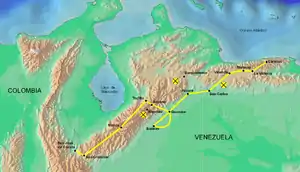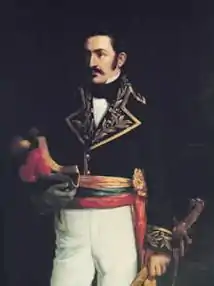Battle of Los Horcones
The Battle of Los Horcones, part of the Admirable Campaign, was a military conflict in the Spanish American wars of independence fought on 22 July 1813 between the pro-independence forces led by José Félix Ribas and Spanish royalist troops under colonel Francisco Oberto at the plain of Los Horcones.[1] Ribas was victorious, capturing much of the Spanish equipment and capturing more than 300 prisoners.
| Battle of Los Horcones | |||||||
|---|---|---|---|---|---|---|---|
| Part of Venezuelan War of Independence | |||||||
 Route of the Admirable Campaign | |||||||
| |||||||
| Belligerents | |||||||
|
|
| ||||||
| Commanders and leaders | |||||||
|
José Félix Ribas Jacinto Lara Florencio Jiménez |
Francisco Oberto Pedro González de Fuentes Manuel Cañas | ||||||
| Strength | |||||||
|
500 men 60 cavalry |
700 men 100 cavalry 4 artillery pieces | ||||||
| Casualties and losses | |||||||
| Many dead |
Many dead 300 captured Artillery, weapons, medical supplies and transports captured. | ||||||
Background
On 6 July, Simón Bolívar entered the city of Barinas, evacuated just the day before by Antonio Tíscar. On 9 July, Simon ordered José Félix Ribas to go through El Tocuyo to Chubasquén, where royalist lieutenant Pedro González de Fuentes was going in front of a royalist column which included infantry and cavalry reinforcements just incorporated from Coro.
Ribas marched through the ordered route and, on 18 July, took El Tocuyo for the patriotas.
On 20 July, the royalist troops incorporated the men that ship lieutenant Manuel Cañas had saved from the Battle of Agua Obispo against lieutenant colonel Atanasio Girardot, now counting with 400 men and 100 cavalry, plus 4 artillery pieces of calibers 6 and 8, two of each. At the same time, Ribas marched to Quíbor and Barquismeto.
Being aware of these events, colonel Francisco Oberto traveled from Araure to Barquisimeto with 300 men and incorporated González's column, with the royalist finally accounting for a total of 700 men plus the cavalry and artillery.
Battle

Francisco Oberto, the Spanish commander, took defensive positions with its royalist troops at Los Horcones plain, 5 km away from Barquisimeto in the route to Quíbor, where they waited for the arrival of the patriotic column, commanded by José Félix Ribas and Jacinto Lara.
The battle started at 11:00 and the royalist troops rejected the first two attacks thanks to its artillery, but a third attack finally took over the Spanish positions. This was largely thanks to sub-lieutenant Gabriel Picón González, who then aged 14 years old and became a hero by rushing and taking a Spanish cannon despite getting his right femur shattered due to shrapnel.
When the battle was lost for the royalists, Oberto and Cañas fled with 15 soldiers through San Felipe, with Ribas chasing them with 50 horsemen and finally getting them at Cabudare.
Aftermath
Both sides suffered heavy human losses,[2] but otherwise Ribas achieved a complete victory for the patriotics, capturing all of the four artillery pieces as well as other weapons, medical supplies, transport vehicles and over 300 prisoners.
Gabriel Picón became a hero for Simón Bolívar, who quickly wrote a letter to Antonio Rodríguez de Picón, Gabriel's father and commander of Mérida, telling that his son would become "eternal in the annals of Venezuela" due to his courageous action that day. Afterwards, Bolívar kept Picón under his protection, who wouldn't be able to pursue a military career and instead focused on politics, and later would become the governor of Mérida. Picón would get known as the "boy-hero of the Battle of Los Horcones" due to his young age.[3]
Gabriel Picón is buried in the National Pantheon of Venezuela, resting place for Venezuelan national heroes, and has a parish named after him in the Alberto Adriani Municipality.
References
- "22 de julio de 1813, Batalla de Los Horcones" (in Spanish). Procuraduría General de la República. Archived from the original on 11 February 2015. Retrieved 11 February 2015.
- "Batalla de los Horcones – 22.7.1813" (in Spanish). Batallas de Venezuela. Archived from the original on 11 February 2015. Retrieved 11 February 2015.
- Chalbaud, Carlos (1983). Historia de Mérida. Consejo de Publicaciones de la Universidad de los Andes. p. 175. ISBN 980-221-719-0. Retrieved 18 February 2015.